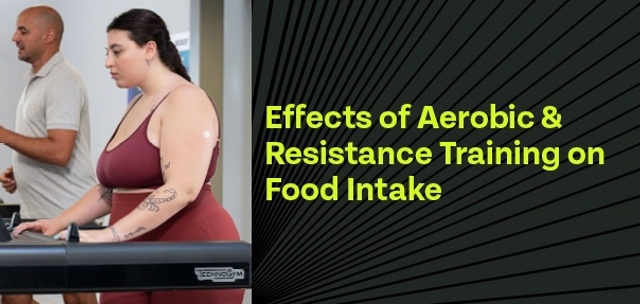This Q&A is a follow up to a webinar from Technogym called Effects of Aerobic & Resistance Training on Food Intake. The session looked at how cardio and strength training affect hunger and how much we eat.

If you missed the webinar, you can access it here.
Q: Thus far, it seems hard to make any real conclusions with so few studies done and many of them being done appear to have low participant numbers. It seems surprising when there is so much focus on exercise and weight.
Research to date has focused predominately on the effects of aerobic exercise on the control of appetite. The majority of these studies are acute in nature i.e., they look at the effects of a single bouts of aerobic exercise on appetite and energy intake, but there are fewer well controlled aerobic exercise training studies examining the effects of long-term regular exercise training on the control of appetite. Relatively small sample sizes are a feature of these studies, but there are a number of meta-analyses in the area where the pooled effect sizes can be seen. In terms of studies examining the effects of resistance exercise, there are comparatively few studies to date which does make it difficult to draw clear conclusions.
Q: Would combined resistance and aerobic exercise within the same training session vs resistance training alone, be effective in regulating food intake?
Evidence suggests that single bouts of exercise, whether aerobic or resistance, do not automatically lead to an increases in energy or food intake following exercise. While transient changes in gut hormones and subjective appetite are seen after single bouts of resistance or aerobic exercise, these do not generally translate to changes in actual food intake.
Q: What role might hydration play? I.e. if more water is consumed during exercise, how does that affect perception of hunger?
This is a good question but one that is not well studied. Generally, water intake during and following acute bouts of exercise are controlled and matched to the non-exercise control condition (or at least they should be), but few studies have directly examined the effects of water intake during exercise on subjective appetite or energy intake. The below study showed no effect of hypohydration produced by exercising in the heat on subsequent appetite or energy intake, but I do not know of any study experimentally manipulating fluid intake during exercise that measures subsequent appetite or energy intake.
DOI: 10.1080/02640414.2014.962578
Q: Please show again the slide on J shaped relationship: the conclusions at the bottom of the slide were what?
Discussion of this proposed model can be found in the below articles:
https://doi.org/10.1042/CS20160006
https://doi.org/10.1016/j.physbeh.2017.12.032
Q: Have there been studies that look at how the macronutrient composition (i.e. carbs vs protein heavy) influence satiety post exercise?
In general, there are hieratical effects of macronutrient composition on subjective appetite and satiety. Protein, carbohydrates and fat exert different effects on satiety or energy intake in the order protein > carbohydrates > fat. When the energy density of different foods is equalized the differences between fat and carbohydrates are modest e.g., see https://doi.org/10.1098/rstb.2022.0449.
Eating before exercise generally reduces hunger during and shortly after an exercise bout as compared to fasted exercise, but again this does not necessarily translate into a reduction in food intake post-exercise unless food is offered immediately after exercise (see below review). Given the effects of macronutrient composition on subjective appetite, satiety and appetite-related hormones, it is plausible that you might see differences on subjective appetite, satiety and appetite-related hormones if the macronutrient composition of a pre-exercise meal differs, but I’m not aware any studies looking at this.
https://doi.org/10.1016/j.physbeh.2019.112733
Q: Resistance training, perhaps, can lead to different adaptations in appetite control, as different types of RT (hypertrophy and strength) in the resistance training continuum lead to different metabolic adaptations and costs. What do you think about that?
It is certainly plausible to suggest that if different metabolic adaptations or change in body composition are seen then they might result in differences in appetite, but the evidence examining the effects of resistance exercise on appetite control is so limited that it is not possible to say at the minute.
Q: What is the importance of strength training with GLP1 medications?
Resistance has been shown to better preserve lean tissue during weight loss when added alongside lifestyle approaches or bariatric surgery, with resistance exercise (and to a lesser extent, higher protein intake during calorie restriction) promoting increased protein synthesis. It is intuitive to therefore suggest that adding resistance exercise alongside GLP-1r agonists will be of benefit in preserving lean tissue during weight loss. It is worth noting though there very few studies examining the effects of resistance exercise alongside GLP-1r agonist use at the minute, so we are generally making inferences from studies in athletes or from studies in those living with overweight or obesity undergoing dietary energy restriction. There are a couple of points worth noting from studies specifically in those with overweight or obesity following energy-restricted diets that are of relevance here:
- While resistance exercise has been shown to attenuate lean tissue loss during an energy-restricted diet, resistance exercise becomes less effective at attenuating lean tissue losses when the degree of energy restriction is severe. These data suggest that the magnitude of the energy deficit is an important mediator of whether resistance exercise (or protein) can counter the breakdown of muscle proteins for oxidative energy metabolism during periods of energy deficit. There is also some evidence from bariatric surgery that the beneficial effects of resistance exercise in preserving lean mass are only seen in younger individuals. As such, it is important to assess the impact of resistance exercise on lean and muscle mass/function directly during or following weight loss using GLP-1r agonists rather than make inferences from other populations or modalities.
- Compared with persons with normal weight, those with obesity typically have more muscle mass but poorer muscle quality. Importantly, resistance exercise appears to increase muscle strength, physical function, and muscle quality even in the presence of losses of lean mass. This suggests that the relationship between muscle function and muscle mass is not linearly related. Indeed, dietary studies have shown that muscle strength can be maintained or increased with resistance exercise during weight loss, with functional/physical function tests also showing improvements. Furthermore, measures of muscle quality such as myosteatosis (fat infiltration in muscle) are also improved.
Take-home message: More studies are needed that specifically measure skeletal muscle mass during and following weight loss using GLP-1r agonists, including measures of muscle quality and function alongside (direct) measures of muscle mass.



